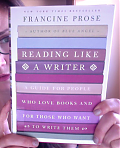
Francine Prose
Reading Like a Writer
A Guide for People Who Love Books and for Those Who Want to Write Them
Reading books on writing hasn’t appealed to me until lately, and I still haven’t done much of it. I always prefer reading novels themselves, but again, lately I’ve been wondering if I could get more from what I read. A quick search led me to Reading Like a Writer, and the library I use in Rome happened to have it (lucky me!). And what an excellent find.
One of the reasons why I like this book so much and almost immediately is that Francine Prose, who has written and taught writing for years, opens with the question: “Can creative writing be taught?” She goes on to discuss this point, not committing herself to one answer or another, because as a creative writing teacher she can’t. Yet most of the teaching she received was through the writers that she read and admired.
I read for pleasure, first, but also more analytically, conscious of style, of diction, of how sentences were formed and information that was being conveyed, how the writer was structuring a plot, creating characters, employing detail and dialogue.
The chapters follow the points listed above through Prose’s favorite writers, those she turned to for figuring out kinks in her own writing and how to make it better. For dialogue she turns to Henry Green; for words it’s Flannery O’Connor; for paragraphs she reads Isaac Babel; and for characters she turns to Jane Austen. Each chapter is filled with excerpts that Prose then picks apart to show the reader just how she thinks what she is examining is working. Here is a quote from the chapter “Details”:
Great writers painstakingly construct their fictions with small but significant details that, brushstroke by brushstroke, paint the pictures the artists hope to portray, the strange or familiar realities of which they hope to convince us.
But one of the most valuable insights that Prose suggests, something that always bothers me when I start to think about writing workshops and their value or homogenizing effect, is that good writers often break some rules. In the chapter “Narration”:
Though students of writing are usually instructed—with good reason—that it is necessary to pick a point of view and stick to it, this, like any “rule,” can be circumvented by any writer skillful enough to get away with it.
She then writes about the opening scene of Madame Bovary, written from the point of view of a character we never see again. But the writer who Prose looks up to for dissipating firm convictions into hot air, is Chekhov. After she told her class that the storyline must be clear from the beginning, she read Chekhov’s story “In the Ravine,” that leaves the main character unclear until the middle. When she told her students not to shift point of view, she then read “Gusev” where the point of view shifts, and to top it off, the main character dies near the end and the narrative continues despite that.
By focusing on books and reading, so much about writing is revealed in the best way possible, because after all, that’s where the urge to write originates from. Unfortunately I have to return Reading Like a Writer to the library in a few days, but maybe I’ll have to hunt down my own copy as there so much this book that deserves to be underlined and frequently returned to.
· · · · · · · · · · · · · · · · · · · ·